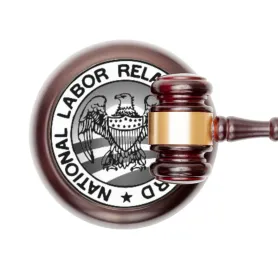As we have discussed before, several years ago, the Board instituted a significant paradigm shift in analyzing the lawfulness of employers’ handbook policies in relation to employees’ Section 7 rights, when it issued its decision in The Boeing Company, 365 NLRB No. 154 (2017). Boeing established a balancing test that takes into account the employer’s legitimate business interest for the policy at issue, and the nature and extent of the potential impact on NLRA rights. The new framework discarded the previous test of whether employees “would reasonably” construe the language to prohibit protected, concerted activity.
Since Boeing, the NLRB General Counsel issued an Advice Memorandum providing extensive guidance regarding the three categories of employment rules, policies and handbook provisions the Board would consider as part of the balancing test, and the Board has issued a number of decisions analyzing employer handbook policies with this in mind (which we have discussed here, here and here).
The Board’s recent decision in Medic Ambulance Service, Inc. and United Emergency Medical Service Workers, Local 4911, AFSCME, AFL-CIO, 370 NLRB No. 65 (January 4, 2021) is a continuation of the Board’s implementation of the Boeing analysis for facially-neutral employer policies. The Board held that the employer’s social media policies did not violate the Act. The policies included many common prohibitions seen in employee handbooks, such as prohibiting the right of employees to make inappropriate communications, disclose confidential information, use the company’s name or logo without approval, post photos of coworkers without consent, share employee compensation information, and disparage the company or others related to it via social media.
Background
Since June 2010, the employer – an emergency transportation and advanced life support ambulance operator – has maintained a number of policies governing employee social media conduct. Since April 2016, the handbook applied equally to both union-represented and non-union-represented employees. The union did not confer, bargain, or otherwise object to the handbook provisions until the filing of an unfair labor practice charge in 2017.
The union’s filing was prompted when the employer began enforcing the policies against bargaining unit members allegedly engaged in protected, concerted activity.
The union argued that the following social media policies violated the Act because they unlawfully interfered with their members’ exercise of Section 7 rights:
-
Inappropriate communications, even if made on your own time using your own resources, may be grounds for termination. We encourage you to use good judgement when communicating via blogs, online chat rooms…
-
Do not disclose confidential or proprietary information regarding the company or coworkers. Use of copyrighted or trademarked company information, trade secrets, or other sensitive information may subject you to legal action.
-
Do not use company logos, trademarks, or other symbols in social media. You may not use the company name to endorse, promote, denigrate or otherwise comment on any product, opinion, cause or person.
-
Be respectful of the privacy and dignity of your coworkers. Do not use or post photos of coworkers without their express consent … [e]mployees must not post pictures of company owned equipment or other employees on a website
-
All telephone calls regarding a current or former employee’s position with our company must be forwarded to your supervisor.
-
Employees must not use blogs, SNS [(Social Networking Sites)], or personal Web sites to disparage the company, its associates, customers, vendors, business practices, patients, or other employees of the company.
The Administrative Law Judge recommended finding a violation of Section 8(a)(1) as to the policies referenced above.
Board Reverses ALJ, Holding The Employer’s Policies Were Lawful and Must Not Be Read in Isolation
In evaluating rules (1) through (5) above, the Board reversed the ALJ, and held that each of the social media policies referenced above was lawful. The Board concluded these rules fell under Category 1(a) under Boeing – i.e., always lawful – because a reasonable employee would not interpret them as prohibiting the exercise of Section 7 rights, and any potential adverse impact is outweighed by the justifications. Further, the Board stressed that it “must refrain from reading particular phrases in insolation,” and instead, the employer’s policies should be read as a whole.
Specifically, when read in context, the Board concluded the five policies were lawful, based on the following reasoning:
-
“Inappropriate communications” rules are generally “always lawful,” and particularly here, a reasonable employee would read the introductory language in context of the specific guidelines that followed.
-
A rule prohibiting the sharing of “confidential information,” which does not specifically identify employees’ contact information or terms and conditions of employment, is not unlawful when read in context.
-
Prohibiting employees from using the company’s name in a social media post is not unlawful here, because the rule should be read in context of another rule that prohibits employees from speaking on behalf of the company, which the Board reasoned was the basis for the employer’s rule here.
-
A rule prohibiting the posting of photos of employees without their consent was geared to protect employees’ privacy and confidentiality interests, and thus outweighed any perceived limitation on the exercise of Section 7 activity.
-
A rule restricting employees from sharing employee compensation information was lawful because it was limited, in context, to when someone reaches out to the employee to request this sensitive information. It does not generally prohibit employees from discussing compensation information, which is quintessential protected, concerted activity.
The Board Also Concludes the Presumption of Employee Loyalty Made the Employer’s Non-Disparagement Rules Lawful
The Board also reversed the ALJ and found that the employer’s policy prohibiting employees from making disparaging statements about the company or others associated with it to be lawful, citing recent precedent that employers have a legitimate justification, recognized by the Supreme Court, in being able to depend on the loyalty of their employees.
While the Board acknowledged that the non-disparagement rule could reasonably be found to infringe upon the exercise of Section 7 activity, given the “substantial” employer justification for the rule, the Board reaffirmed that such rules are lawful, on balance.
Member McFerran’s Dissent Foreshadows the Possibility of Change in the New Administration
Member McFerran submitted a pointed dissent, asserting that Boeing and its progeny represented an undesirable shift in the Board’s position regarding its evaluation of the lawfulness of workplace policies.
McFerran argued that each of the rules should have been found unlawful because they are overbroad infringements on Section 7 rights, and not narrowly tailored to promote a legitimate employer interest.
Specifically, McFerran sharply criticized the Board’s holding regarding the non-disparagement rule, noting that she has been troubled by the Board’s categorical determination that such rules are lawful on their face, without taking the time to balance the employee rights against employer interests.
Takeaways
The Board’s recent decision reaffirms the categorical analysis the NLRB has undertaken since Boeing regarding the lawfulness of employer handbook policies, and the plain fact that the current Board has been more apt to find facially-neutral handbook policies lawful when read, in context. Indeed, by reading the allegedly unlawful rules “in context” of surrounding rules and policies and purported business justifications for the rules, the Board has found employer policies lawful, more often than not. The same conclusions were drawn here.
In addition, the Board has lent credence to employer justifications for non-disparagement clauses, finding them categorically lawful — even if the purported justifications are not specifically illustrated in the policies.
While the composition of the Board will not change at least until Member Emanuel’s term expires in August 2021, Member McFerran’s sharp dissent likely foreshadows how the Board may evaluate the lawfulness of the same policies in the future. In other words, there likely will be a change in direction and many employer policies found lawful today could be considered unlawful in the future. We will keep you posted.





 />i
/>i

